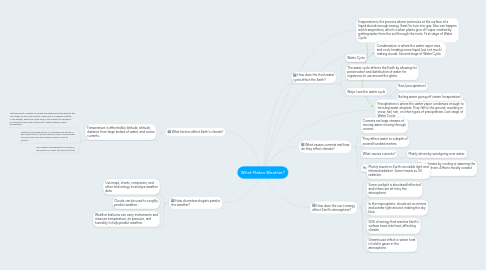
1. How do meteorologists predict the weather?
1.1. Use maps, charts, computers, and other technology to analyze weather data.
1.2. Clouds can be used to roughly predict weather.
1.3. Weather balloons can carry instruments and measure temperature, air pressure, and humidity to help predict weather.
2. What factors affect Earth's climate?
2.1. Temperature is affected by latitude, altitude, distance from large bodies of water, and ocean currents.
2.1.1. Latitude affects climate since latitude determines how directly the sun strikes an area. The equator, which has a 0 degrees latitude is the hottest, while the South Pole is the coldest; its latitude is 90 degrees (same with North Pole). Higher latitude=lower temperature
2.1.2. Altitude is how high terrain is. The higher the terrain is, the colder it gets. This can result in a year-round glacier or year-round cold, even when a peak is close to equator.
2.1.3. Since water's temperature increases or decreases at a lower rate than land (5x),
3. Precipitation is where the water vapor condenses enough to form big water droplets. They fall to the ground, resulting in snow, hail, rain, or other types of precipitation. Last stage of Water Cycle.
4. Evaporation is the process where molecules at the surface of a liquid absorb enough energy (heat) to turn into gas. Also can happen with transpiration, which is when plants give off vapor created by getting water from the soil through the roots. First stage of Water Cycle.
5. Condensation is where the water vapor rises and cools (making some liquid, but not much) , making clouds. Second stage of Water Cycle.
6. How does the fresh water cycle affect the Earth?
6.1. Water Cycle
6.2. The water cycle affects the Earth by allowing for preservation and distribution of water for organisms to use around the globe.
6.3. Ways I see the water cycle
6.3.1. Rain (precipitation)
6.3.2. Boiling water giving off steam (evaporation)
7. What causes currents and how do they affect climate?
7.1. Currents are large streams of moving water moving through oceans.
7.2. They affect water to a depth of several hundred meters.
7.3. What causes currents?
7.3.1. Mainly driven by wind going over water.
7.4. How do they affect climate?
7.4.1. Affect climate by cooling or warming the air above them. Affects mostly coastal areas.
